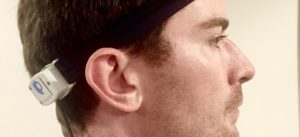A Cure for Motion Sickness without Drugs Could Benefit the Military
By Debbie Gregory.
OtoTech, a new invention from Samuel Owen, could be a game-changer for motion sickness.
While it might not seem like such a big problem, motion sickness affects soldiers riding in vehicles, sailors during moderate as well as rough seas, Air Force personnel and parachutists.
And now, as more and more training is conducted in virtual reality, the problem is expected to worsen.
Owen’s prototype OtoTech is worn on a headband behind the ear, and uses subtle vibrations to change the way the brain computes the fact that the body that it’s attached to is in motion. Early tests show it relieves motion sickness without the side effects of drugs, Owen said, though he admits the science is so young that it’s not clear just how.
While many other devices are designed to treat the symptoms of motion sickness, OtoTech goes after the actual cause.
“Two [of the four vestibulocochlear nerve fibers] go to the brain, two go to your reflexes,” Owen said.
“The working hypothesis is that [the vibration] causes a chaotic and non-informative stimulus to go to the brain. Somewhere, probably the cerebellum, there’s a filtering mechanism that filters out non-informative sensed information. It’s the reason you don’t notice the shirt on your back right now,” he said.
So while you remain consciously aware that you’re moving, the balance portion of your brain stops noticing the fact; the data has been drowned out in white noise from the device.
Initial testing has resulted in a decrease of motion sickness without affecting balance, vision or alertness.
Owen says that he has initially marketed the device to vertigo sufferers.
Double-blind trials conducted by researchers at Jaguar Land Rover have so far yielded positive results.








